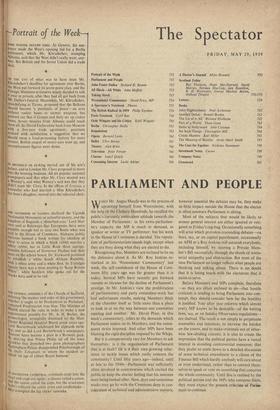PARLIAMENT AND PEOPLE
WHEN Mr. Angus Maude was in the process of uprooting himself from Westminster, with the help of the Chiltern Hundreds, he recalled the public's curiously ambivalent attitude towards the Member of Parliament : in his extra-parliamen- tary capacity the MP is much in demand, as speaker or writer or TV performer; but his work in the House of Commons is derided. The reputa- tion of parliamentarians stands high, except when they are busy doing what they are elected to do.
Recognising this, Members are inclined to be on the defensive about it. As Mr. Roy Jenkins re- marked in his 'Westminster Commentary' last week, the self-confidence of the House of Com- mons fifty years ago was far greater than it is today. Several MPs have recently put forward reasons or excuses for the decline of Parliament's prestige. In Mr. Jenkins's view the proliferation of parliamentary and party committee-work has had unfortunate results, making Members think of the chamber itself as 'little more than a place to look in at on the way between one committee meeting and another.' Mr. David Price, in this week's commentary, refers to the demands which Parliament makes on its Members, and the conse- quent strain imposed. And other MPs have been blaming the rigid discipline imposed by the Whips.
But it is comparatively rare for Members to ask themselves: is it the organisation of Parliament that is at fault? Or is it their own growing reluc- tance to tackle issues which really concern the community? Until fifty years ago—indeed, until as late as the 1940s—Parliament was sufficiently often involved in controversies which excited the public to keep the elector feeling that his interests were being looked after. Now, days and sometimes weeks may go by with the Commons deep in con- sideration of technical and administrative matters; however essential the debates may be, they make so little impact outside the House that the elector is often unaware Parliament is sitting.
Most of the subjects that would be likely to arouse general interest are either ignored or rele- gated to Friday's rag-bag. Occasionally something will arise which provokes resounding debates—on Suez, say, or on capital punishment; occasionally an APH or a Roy Jenkins will astonish everybody, including himself, by steering a Private Mem- ber's Bill successfully through the shoals of minis- terial antipathy and obstruction. But most of the time Parliament no longer reflects what people are thinking and talking about. There is no doubt that it is losing touch with the electorate that it exists to serve.
Before Ministers and MPs complain, therefore —as they are often inclined to do—that hostile criticism is tending to bring Parliament into con- tempt, they should. consider how far the hostility is justified. Year after year reforms which almost every MP knows to be desirable—of the betting laws, say, or on Sunday Observance regulations— are shelved. The result is not simply to perpetuate anomalies and injustices, to increase the burden on the courts, and to make criminals out of other- wise law-abiding citizens; it is also to create the impression that the political parties have a vested interest in avoiding controversial measures; that they prefer to settle down to a detailed discussion of some technical amendment to a clause of the Finance Bill which hardly anybody will care about or even understand, rather than to commit them- selves to speak or vote on something that concerns the whole community. Until this is realised by the political parties and the MPs who compose them, they must expect the present criticism of Parker ment to continue.














































 Previous page
Previous page